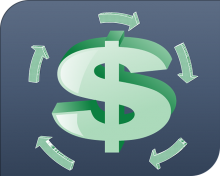
Fred Parrish, Founder & CEO, The Profit Experts
Too often companies do not pay enough attention to cost control until they run out of cash. By then it’s too late to take the actions necessary to avoid major problems.
Anyone who has ever tried to raise capital knows that the absolute worst time to get cash from banks or other funding sources is when you desperately need it. The most likely result of a severe cash shortfall without some advanced notice and no access to additional capital is failure.
Sure, some companies have survived in times of significant cash difficulties without planning. However, do you really want to take the chance that your business will be one of the “lucky” ones?
It takes disciplined planning to avoid the inevitable outcome of an unforeseen cash crisis. How do you know in advance when trouble is brewing?
The only sure way of avoiding or at least managing through a severe cash flow crisis is to estimate the company’s future performance – profit – and the cash flow generated and required by that performance. By knowing when a cash crunch will develop, you can take the necessary action to manage through it before it materializes.
It may mean you will need to reduce expenses (payroll, travel, etc.), cut back or delay capital expenditures (equipment, etc.) or borrow the necessary funds to get through the cash shortage. Although it can be a painful process, it is possible to weather the storm when you are prepared. Being prepared can be the difference between life and death for your business.
Your most important tool in this effort is a forecast. Don’t confuse this with a static budget. This is a changing set of numbers that you will update as conditions change. The forecast can be as simple as writing an estimate of revenue with the expenses you expect to incur while generating and supporting that revenue. As long as it gives you an idea about what the target is, and what it will take to get there, you will have something to compare with your actual performance each month.
As you develop your forecast, keep this point in mind: Cash and profit are not interchangeable. Since companies can’t actually “spend” profits, they must have sufficient cash available to fund operations until conversion occurs.
Converting profit into cash in the shortest possible time should be a goal of every small business owner. Here are three principles to guide you toward that goal:
Principle 1: Cash is the Lifeblood of Your Business. Since there is nothing tangible returned by profit alone, the without cash conversion there is no REAL profit.
Principle 2: Generating cash is the most important aspect of profit management. Cash is required to purchase every item and service your business needs, and it has to come from somewhere – either operations or outside funding.
Principle 3: Profitability and cash flow are inextricably linked. You must have profits to produce cash and you must have cash to produce profits. The cycle cannot be broken indefinitely without seriously negative results. Even though it is possible to have a scenario where a company is operating at breakeven or with losses and also having a positive cash flow, it is a short-term condition that cannot be sustained indefinitely.
When you compare your company’s actual performance to your forecast, you can determine what action, if any, you must take to get back on track with the plan. Over time, as you continue to make the comparisons, you will begin to refine your estimates to incorporate a much more significant level of detail. After only a little time you will have developed a very sophisticated and useful tool.
As you work on your company’s finances, the knowledge you gain and the “feel” you will develop will significantly improve your effectiveness. You only need to start at the beginning and maintain the determination to continue the process. If you do that, you cannot help but improve the performance and value of your business.
Image Courtesy: Pixabay/Deedster
About the Author
Fred Parrish is Founder and Chief Executive Officer of The Profit Experts™., an affordable CFO service that helps small business owners improve their profitability and cash flow. He is also creator of The Profit Beacon™, a new app that provides predictive analytics to help businesses make smart and timely decisions, and author of “The Profit Mentality.” During a 37-year career, Fred has held positions from staff accountant to CEO in public and private companies with revenues ranging from startup to $3.5 billion. He’s served on the boards of directors for 12 organizations in aerospace, manufacturing, healthcare services, insurance, international missions, technology and other sectors. Small businesses from restaurants to plumbers to manufacturers have survived and thrived with expertise from Fred and The Profit Experts. He is co-writing a book with Michael E. Gerber, author of the E-Myth series, known as the World’s #1 Small Business Guru. For more information please visit https://theprofitbeacon.com.